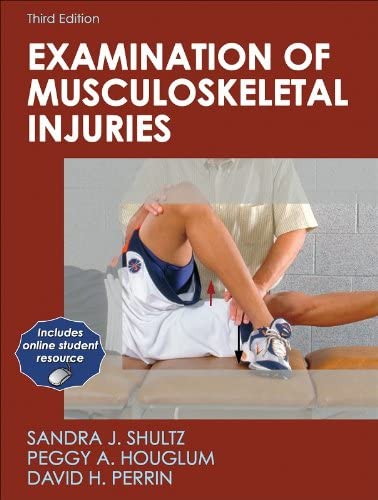The third edition of Examination of Musculoskeletal Injuries assists both current and future rehabilitation professionals in recognizing musculoskeletal injuries, performing musculoskeletal examinations of athletic injuries, and evaluating if and when to refer clients to a physician's care. The text will help students master the skills required for completing the Board of Certification examination for athletic trainers by thoroughly covering all the content in this area of specialization set forth in the National Athletic Trainers' Association (NATA) Athletic Training Educational Competencies.
Completely updated and expanded, the third edition of Examination of Musculoskeletal Injuries incorporates an increased emphasis on clinical decision making, problem solving, and integration of skill application. Revised chapter-opening scenarios present open-ended real-life situations that initiate discussion of the complexity of athletic injury examination. Review and critical thinking questions have been updated to assist readers in developing their clinical decision-making and problem-solving skills. Laboratory activities have been added to aid students with hands-on practical application of the material. Data tables that report the sensitivity and specificity of special tests strengthen the evidence-based selection of those tests as they are used in the examination procedure. Also, revised information in the functional anatomy and injury recognition sections form a more cohesive connection with the musculoskeletal examination process.
Examination of Musculoskeletal Injuries begins with comprehensive coverage of foundational assessment tools, which prepare readers to understand and apply the joint-specific evaluation techniques that follow. Next, recognition and examination of injuries and conditions specific to each body region are addressed. Real-life scenarios precede the discussion of each examination strategy. The final section of the text addresses general medical conditions normally found in active persons. Because examinations of these conditions usually are the physician's responsibility and require the use of diagnostic tests for identification, the text prepares readers to make appropriate referrals based on patients' histories, signs and symptoms, and their own observations. This unique text categorizes injury examination strategies into on-site, acute, and clinical protocols, allowing rehabilitation professionals and students to focus their evaluation skills on emergent, nonemergent, and postacute conditions.
Examination of Musculoskeletal Injuries also includes learning elements and supplemental materials for students, professionals, and instructors:
-Pedagogical aids such as chapter objectives and summaries, key terms, review and critical thinking questions, a glossary, references, and bibliographical material assist in learning and retaining crucial material.
-More than 120 lab activities for each chapter assist students in building their clinical decision-making and problem-solving skills.
-Special warning boxes and reminder boxes highlight techniques and knowledge crucial for avoiding further injury, permanent disability, or even death.
-Over 500 photographs and nearly 300 illustrations and tables enhance comprehension of content.
-Checklists provide the framework for developing a systematic approach to injury examination in various settings.
Examination of Musculoskeletal Injuries, Third Edition, features an online student resource (OSR) that will help students thoroughly understand the material. The OSR includes printable examination checklists; tables detailing range of motion, neurological conditions, and strength; and superb full-color photographs of skin ailments that will enhance students' ability to identify skin disorders. For instructors, the text includes a full range of ancillaries including an image bank, instructor guide, and test bank.
Human Kinetics' Athletic Training Education Series contains six outstanding textbooks, each with its own supplemental instructional resources. Featuring the work of respected athletic training authorities, the series parallels and expounds on the content areas established by the National Athletic Trainers' Association (NATA) Education Council.


دیدگاه کاربران